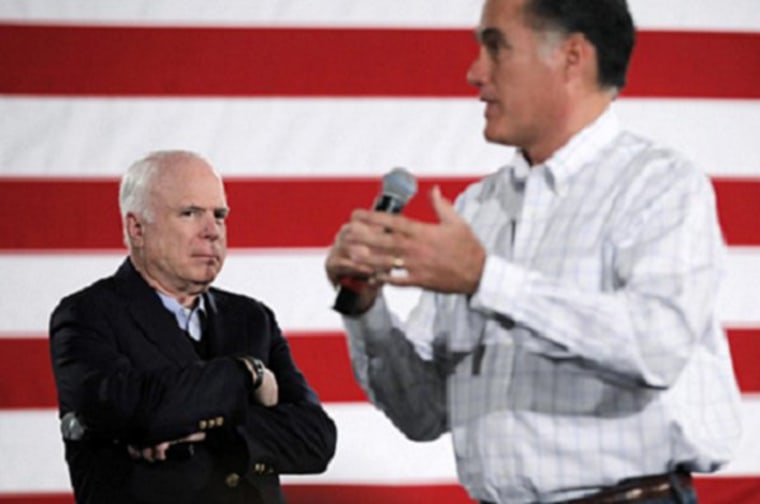Sen. John McCain (R-Ariz.) talked with ABC's Jake Tapper yesterday via satellite from Afghanistan, and one exchange, in particular, stood out for me.
TAPPER: Let's turn now to Afghanistan, where you're sitting right now. The big news is that Hamid Karzai, the Afghan president, has confirmed that the United States, the Afghan government, are in three-way talks with the Taliban. Are those talks a mistake?MCCAIN: No, I think it's important to have talks wherever you can.
This is not at all an unusual position for the senator to take. On the contrary, the consensus among most national security and foreign policy experts is that talks with the Taliban are unavoidable, and may even be a prerequisite to a successful U.S. policy in Afghanistan. It was David Petraeus, in his capacity as commander of U.S. forces in Afghanistan (before his transition to the CIA), who helped push for these talks in the first place.
What makes McCain's response noteworthy, though, isn't that he agrees with the Obama administration, but rather, that he disagrees with Mitt Romney -- the Republican presidential candidate McCain has enthusiastically endorsed.
The former governor, who has no background in foreign policy or national security, recently proclaimed: "The right course for America is not to negotiate with the Taliban while the Taliban are killing our soldiers. The right course is to recognize they're the enemy of the United States."
It's a position that isolates Romney to a surprising degree. For example, Romney also rejects the position held by James Shinn, who happens to be Romney's top foreign policy advisor on Afghanistan, and who has said direct talks with the Taliban is "the only way in which this war is likely to end."
Mitchell Reiss, a well-known academic, diplomat, and State Department veteran, is another leading Romney advisor on international affairs. Reiss also backed U.S. talks with the Taliban, only to see his candidate take the opposite position.
Taken together, Romney disagrees with McCain, President Obama, U.S. military leaders, and the people Romney hired to help him understand foreign policy. That doesn't necessarily make Romney wrong -- just because a policy enjoys a consensus doesn't make it right -- but he hasn't been able to explain in any depth why Taliban talks are a mistake.
It also ties into a larger pattern of confusion for Romney. Earlier this month, he condemned the scheduled withdrawal of U.S. troops from Afghanistan based on a rationale that quickly fell apart.
This keeps happening to the former governor. Just recently, Romney flip-flopped on Iraq and couldn't answer a question about an al Qaeda affiliate, Al Shabab, controlling significant territory in Somalia. His take on Iran is gibberish; his call for a trade war with China is nuts; and he's under the false impression that there are "insurgents" in Iran.
Worse, Romney has struggled in this area for quite some time.
Remember the time Romney told ABC News he would "set a deadline for bringing the troops home" from Iraq -- but only if it's a secret deadline? How about the time Romney, more than four years into the war in Iraq, said it's "entirely possible" that Saddam Hussein hid weapons of mass destruction in Syria prior to the 2003 invasion? Or the time Romney pretended "Hezbollah and Hamas and al Qaeda and the Muslim Brotherhood" were all the same thing? How about my personal favorite: the time Romney made the bizarre assertion that IAEA weapons inspectors were not allowed entry into Saddam Hussein's Iraq?
More recently, Romney tried to trash the New START nuclear treaty in an op-ed, prompting Fred Kaplan to respond, "In 35 years of following debates over nuclear arms control, I have never seen anything quite as shabby, misleading and -- let's not mince words -- thoroughly ignorant as Mitt Romney's attack on the New START treaty."
He's even picked a fight over President Obama's strike on Osama bin Laden, ignoring the fact that Romney took an entirely passive attitude towards the al Qaeda leader, saying "it's not worth moving heaven and earth" to get the terrorist responsible for 9/11. Around the same time, Romney said he would not order a strike into Pakistan to get bin Laden, rejecting Obama's willingness "to enter an ally of ours" to target the terrorist leader.
Given that this guy's experience in international affairs is limited to Swiss bank accounts and stashing cash in the Caymans, Romney's efforts to overcome this deficiency in his resume aren't going over well.
